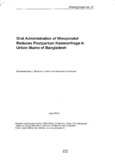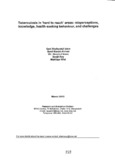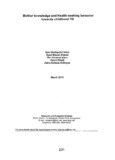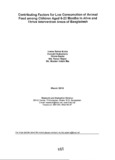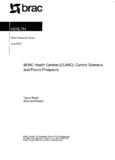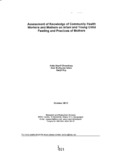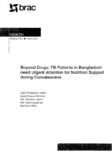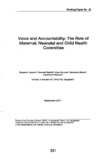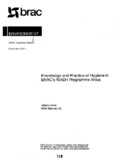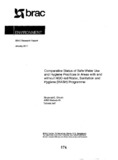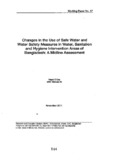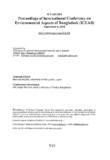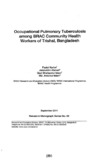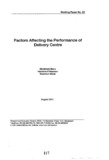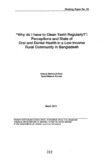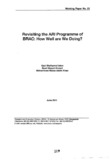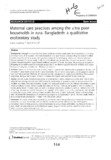Health Studies: Recent submissions
Now showing items 41-60 of 231
-
Oral administration of misoprostol reduces postpartum Haemorrhage in urban slums of Bangladesh
(BRAC Research and Evaluation Division (RED), 2013-04)To avert deaths from postpartum haemorrhage (PPH), Manoshi initiated community health workers (CHW) administered oral misoprostol (400~g) to women following childbirth either at delivery centers or home in slums of Dhaka ... -
Tuberculosis in 'hard to reach' areas: misperceptions, knowledge, health-seeking behaviour, and challenges
(BRAC Research and Evaluation Division (RED), 2013-03)This study was conducted to explore the knowledge and perceptions of health workers and community people about tuberculosis in geographically inaccessible (hard-to-reach) tuberculosis (TB) programme areas of BRAG. The ... -
Knowledge and practice of formal physicians regarding control and prevention of TB in light of national guidelines
(BRAC Research and Evaluation Division (RED), 2013)The study explored the current knowledge and practice of interns and general physicians regarding control and prevention of tuberculosis in light of national guidelines. The study was conducted on 13 public and seven ... -
Mother knowledge and health-seeking behavior towards childhood TB
(BRAC Research and Evaluation Division (RED), 2013-03)Introduction: BRAC in association with NTP recently started the community-based child TB programme. So far, no independent study has been conducted to explore the extent to which the objectives of the programme have been ... -
Contributing factors for low consumption of animal food among children aged 6-23 months in alive and thrive intervention areas of Bangladesh
(BRAC Research and Evaluation Division (RED), 2013-03)Introduction: In Bangladesh about two-thirds of total food consumption is rice as main staple food, especially for the poor, in addition to some vegetables, pulses and small quantities of fish, meat, egg, etc. if and ... -
BRAC Health Centres (CLINIC): current scenario and future prospects
(BRAC Research and Evaluation Division (RED), 2013-06)OBJECTIVE This study was conducted to understand the current state of affairs in the upgraded BRAC Health Centres (now BRAC clinics) with in terms of infrastructure, operation, access, utilization of services and client ... -
Current status of maternal and child health indicators in BRAC EHC Programme areas of Bangladesh
(BRAC Research and Evaluation Division (RED), 2013-02)Essential Health Programme (EHC) is one of many development efforts of BRAC providing an integrated package of preventive, promotive and basic curative services at a minimum cost to improve health and nutrition of the ... -
Assessment of knowledge of community health workers and mothers on infant and young child feeding and practices of mothers
(BRAC Research and Evaluation Division (RED), 2013-10)Poor infant feeding practices are some of major causes of under-nutrition in children under five years of age in Bangladesh. In order to address the issue, BRAC ·has implemented the Alive and Thrive (A&T) programme to ... -
Beyond drugs: TB patients in Bangladesh need urgent attention for nutrition support during convalescence
(BRAC Research and Evaluation Division (RED), 2013-03)Tuberculosis (TB) is a global disease, which is responsible for 1.4 million deaths each year (WHO 2010). Bangladesh is the sixth highest TB-burden country in the world. TB treatment may be complicated when malnutrition ... -
Voice and accountability: the role of maternal, neonatal and child health committee
(BRAC Research and Evaluation Division (RED), 2011-09)The study aims to explore how the MNCH committee encouraged community participation and how its communication activities empowered the community people to ensure the healthcare needs of the poor and disadvantaged people. ... -
Knowledge and practice of hygiene in BRAC's WASH Programme areas
(BRAC Research and Evaluation Division (RED), 2011-12)Improved hygiene behaviour is one of the most effective means of reducing disease occurrence. However, question may arise, which factors did contribute to such improvement? Past studies seldom addressed these issues ... -
Comparative status of safe water use and hygiene practices in areas with and without NGO-Ied Water, Sanitation and Hygiene (WASH) Programme
(BRAC Research and Evaluation Division (RED), 2011-01)More than 90% people in Bangladesh have access to improved water supply system, but arsenic is posing a threat to this achievement. Additionally, hygiene is considered as one of the challenging areas to deal in the ... -
Changes in the use of safe water and water safety measures in water, sanitation and hygiene intervention areas of Bangladesh: a midline assessment
(BRAC Research and Evaluation Division (RED), 2011-11)The BRAC Water, Sanitation and Hygiene (WASH) programme reached 150 upazilas (sub-districts) in collaboration with the Government of Bangladesh since 2006. This study assessed the changes in the use of tubewell water and ... -
Status of arsenic test and exposure to arsenic-contaminated tubewell water: a population-based study in Southern Bangladesh
(BRAC Research and Evaluation Division (RED), 2010-09)This study explores the status of arsenic test of tubewell and exposures to arsenic-contaminated tubewell water in the arsenic prone southern Bangladesh. Through a survey of 6,593 households, a total of 3,812 tubewells ... -
Occupational Pulmonary Tuberculosis among BRAC Community Health Workers of Trishal, Bangladesh
(BRAC Research and Evaluation Division (RED), 2011-09)Different studies reported 2-14 times higher risk of TB for the healthcare workers than the general populations. This poses a serious challenge to the healthcare workers involved in TB control worldwide. BRAG has been ... -
Factors affecting the performance of delivery centre
(BRAC Research and Evaluation Division (RED), 2011-08)The study aimed to measure the performance of delivery centres (DC) and explore the factors related to performance of DCs. Data were collected using qualitative methods during December 2009 - January 2010 from six DCs ... -
"Why do I have to clean teeth regularly?": perceptions and state of oral and dental health in a low-income rural community in Bangladesh
(BRAC Research and Evaluation Division (RED), 2011-03)The general perception that dentistry is expensive keeps many people away from seeking treatment from registered professionals and make them hostage to the services of non-registered lay practitioners. In Bangladesh, no ... -
Revisiting the ARI Programme of BRAC: how well are we doing?
(BRAC Research and Evaluation Division (RED), 2011-06)The ARI (Acute Respiratory Infection) control programme of BRAC has been in operation for the last few years. No independent evaluation has so far been conducted to explore how far the objectives of the programme have ... -
Current state of the Model Shasthya Shebikas of BRAC: a quick exploration of the 'pilot project for SS sustainability'
(BRAC Research and Evaluation Division (RED), 2011-12) -
Maternal care practices among the ultra poor households in rural Bangladesh: a qualitative exploratory study
(BRAC Research and Evaluation Division (RED), 2010)Background Although many studies have been carried out to learn about maternal care practices in rural areas and urban-slums of Bangladesh, none have focused on ultra poor women. Understanding the context in which women ...

